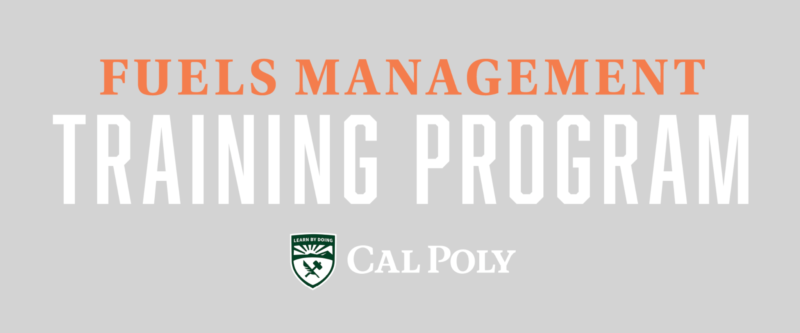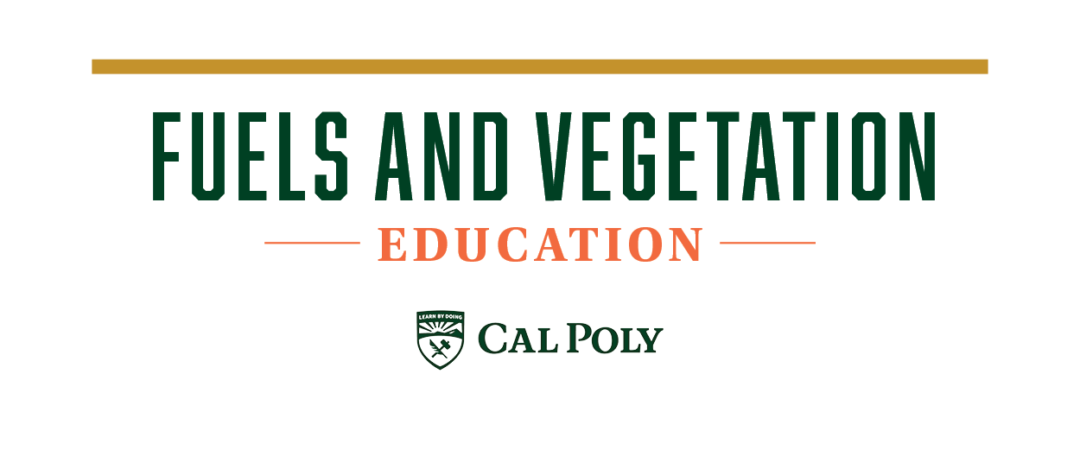Cal Poly SLO
Fuels Treatments in the Wildland Urban Interface (WUI): Sonoma Land Trust’s Laufenburg Ranch Preserve
Laufenburg Ranch Preserve 17104 Spencer Ln, Calistoga, CA, United StatesWant to learn more about fuel treatments on the WUI? Join this field workshop on Thursday, May 18th, from 10:30am - 2:00pm to learn from team members from Sonoma Land Trust. Participants will improve their knowledge of designing and implementing fuel treatments to increase fire resilience and ecological health on the wildland-urban interface (WUI) using
Fuels Treatments in the Wildland Urban Interface (WUI): Lessons learned at the Occidental Arts and Ecology Center
Occidental Arts and Ecology Center 15290 Coleman Valley Rd, Occidental, CA, United StatesThis is an opportunity to learn about vegetation management for fire fuel reduction and enhancing ecological health in the wildland-urban interface (WUI). Want to learn more about fuel treatments on the WUI? Join this field workshop on Saturday, May 20th from 9:00am- 3:30pm to learn from experts in restoration ecology about how to integrate a
Fuels Treatments in the Wildland Urban Interface (WUI): Lessons learned at the Occidental Arts and Ecology Center
Occidental Arts and Ecology Center 15290 Coleman Valley Rd, Occidental, CA, United StatesThis is an opportunity to learn about vegetation management for fire fuel reduction and enhancing ecological health in the wildland-urban interface (WUI). Want to learn more about fuel treatments on the WUI? Join this field workshop on Saturday, May 20th from 9:00am- 3:30pm to learn from experts in restoration ecology about how to integrate a
Fuels Treatments in the Wildland Urban Interface (WUI): Lessons learned at the Occidental Arts and Ecology Center
Occidental Arts and Ecology Center 15290 Coleman Valley Rd, Occidental, CA, United StatesThis is an opportunity to learn about vegetation management for fire fuel reduction and enhancing ecological health in the wildland-urban interface (WUI). Want to learn more about fuel treatments on the WUI? Join this field workshop on Saturday, May 20th from 9:00am- 3:30pm to learn from experts in restoration ecology about how to integrate a
Field Training: Fuels Treatments in the Wildland Urban Interface (WUI): Lessons Learned Post Wildfire at Swanton Pacific Ranch
Swanton Pacific Ranch 125 Swanton Rd, Davenport, CA, United StatesThis is an opportunity to learn about forest health treatments, hazard tree removal, lessons learned in post-wildfire fuels treatments, and biomass removal with the goal of increasing fire resilience and enhancing forest health in the wildland-urban interface (WUI). Want to learn more about fuel treatments on the WUI? Join us for an intriguing conversation on
CalVTP in Practice: Lessons Learned From the Urban Interface in San Mateo County Parks
VirtualThis is an opportunity to learn about a collaborative forest health and fuel reduction project at Huddart and Wunderlich County Parks, in Silicon Valley’s wildland-urban interface (WUI). Participants will increase their knowledge of the planning and design process for ecosystem focused forest health treatments and gain insights into the practical application of the California Vegetation
CalVTP Field Training: Sierra Foothills, Vista Del Rio Project
VirtualThis is an opportunity to learn about a fuel reduction project at Vista Del Rio in Oakhurst, California. Participants will increase their understanding of how CALFIRE used the CalVTP at Vista Del Rio to facilitate vegetation management and fuels reduction. Participants will complete a field treatment tour of the project area, learning about the different treatment methods used and why they
CalVTP Field Training: Sierra Foothills, Vista Del Rio Project
Oakhurst OakhurstThis is an opportunity to learn about a fuel reduction project at Vista Del Rio in Oakhurst, California. Participants will increase their understanding of how CALFIRE used the CalVTP at Vista Del Rio to facilitate vegetation management and fuels reduction. Participants will complete a field treatment tour of the project area, learning about the different treatment methods used and why they
Using the CalVTP: New Implementation Tools and Lessons Learned
VirtualThis webinar will share insights about the latest trends, tips, and practices for agencies, fire safe councils, and landowners seeking to use the California Vegetation Treatment Program (CalVTP) to implement vegetation treatments. The panel consists of CAL FIRE staff from Sacramento headquarters and the San Luis Obispo Unit and consultants who helped to develop and
Forest Health Grants and Forest Practice Documents: Can they be used together to create a more resilient landscape?
VirtualThis webinar is an opportunity to learn about Forest Health Grants and Forest Practice Documents from representatives at CAL FIRE, Crook Logging Inc, Auten Resource Consulting, and the Soquel Demonstration State Forest. Participants will increase their knowledge of how to utilize forest health grant funds, THPs, and other forest practice documents to accomplish forest health
Collaborative Fuels Reduction Projects: Lessons Learned from the Resource Conservation District of Tehama County
VirtualThis webinar is an opportunity to learn about collaborative fuels reduction projects from representatives at the Resource Conservation District (RCD) of Tehama County, the National Park Service, CAL FIRE, and Battle Creek Meadows Ranch. Participants will increase their understanding of how lead agencies, partners, and communities collaboratively design and implement fuels reduction projects using lessons learned from
CalVTP in Practice: Navigating the CalVTP Consultation Process with the California Department of Fish and Wildlife
VirtualParticipants will increase their knowledge of how California Department of Fish and Wildlife (CDFW) engages with CalVTP PEIR/PSA projects. CDFW will begin with an overview of their role with respect to environmental protection, CEQA, and the CalVTP. CDFW will focus on their process for CalVTP project consultation, including the “who”, “what”, “when”, “how”, and “why”



